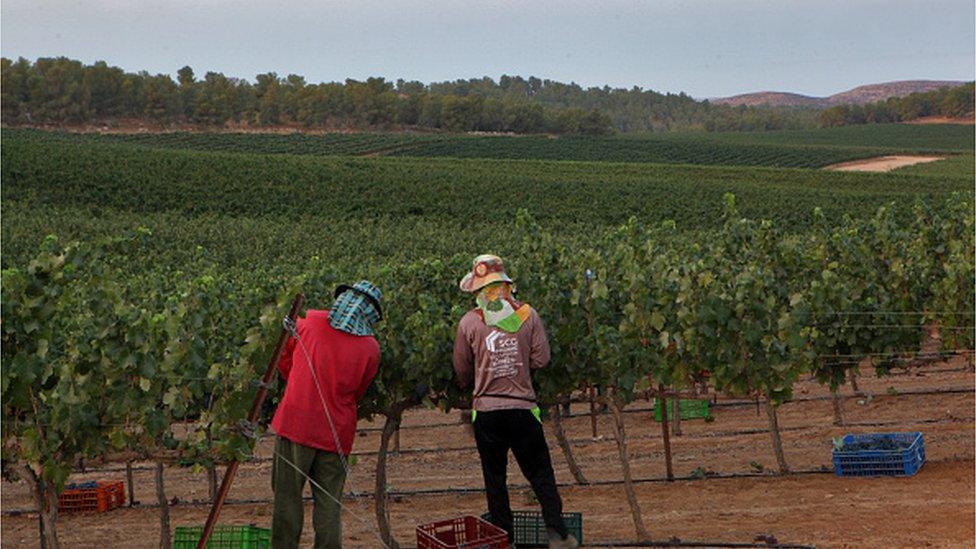The Thais caught up in the Israel-Gaza war
- Published
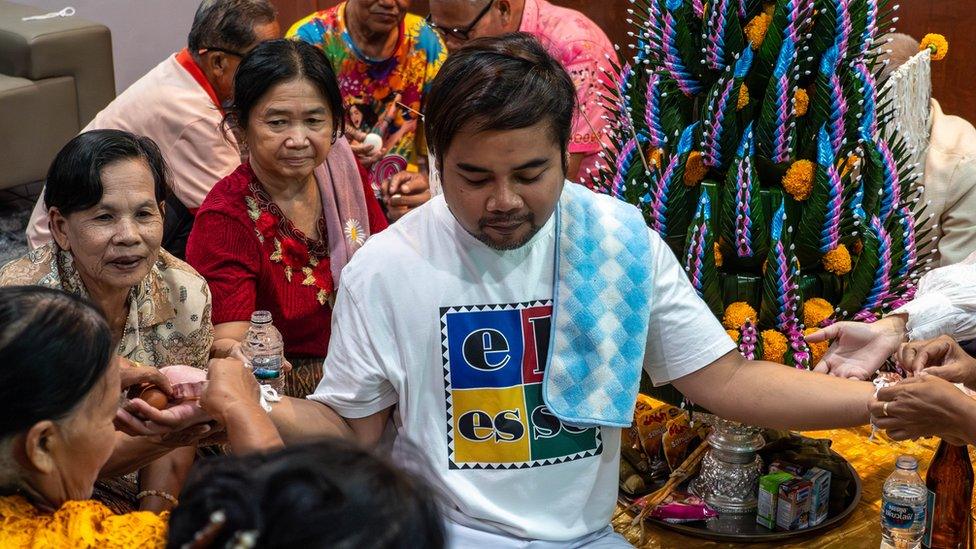
Golf, who received a warm welcome home in Thailand, says he will never return to Israel
In a village lying close to the Mekong River, Weerapon "Golf" Lapchan sits in the centre of a group of Thai elders as they tie white threads around his wrists and chant.
They are literally calling his "kwan" or spirit back to his body, after his narrow escape during the Hamas attack on Israel on 7 October.
The 34-year-old is one of more than 25,000 Thais who were working on farms and orchards in Israel when the Hamas militants stormed in from Gaza. At least 30 Thais were among the 200 or so foreign nationals who were killed in the attack.
Now the Thai government is helping others, thousands of them, to return home.
Thailand provides almost all the foreign farm labour in Israel. And there have been warnings of dire consequences for the country's agricultural economy if large numbers of Thais choose to stay away after the Hamas attack. Many of the Thai workers have to borrow money to go to Israel and now they are returning, jobless and in debt.
Yet some like Golf never want to go back.
On the morning of 7 October, when Golf and his co-workers saw rockets being fired, and then intercepted by Israel's Iron Dome defence system, he says they were not unduly worried.
Golf had been working at an orange orchard in Yesha, just 5km (three miles) from the border with Gaza, for nearly a year. He had experienced rockets flying overhead before.
When they heard gunfire, however, they realised it was more serious, and hid most of that day. In the evening, says Golf, the Hamas attackers returned, throwing grenades and setting the rooms where they were hiding alight. He and 11 others made a run for it. "We jumped over the wall, and they shot at us from behind. Bang, bang, bang, bang."
He says he was wearing only a pair of red boxer shorts when he ran to the middle of the orchard. He and the others crouched down, turning off their phones so the attackers couldn't see the light.
"We were all shocked and kept quiet all night - so quiet that we could hear the falling leaves," he says.
Golf was brought back to Thailand on a government-organised evacuation flight on 13 October. He has decided he will not go back, no matter what he might be offered. Death was just seconds away that day, he says. All 12 of them have decided that they never want to face that again.
At least 19 Thai workers are believed to have been abducted by Hamas, with many more still missing.
In another village to the north, Narissara Chanthasang has had no news of her husband Nattapong since the morning of the attack. He had phoned her to tell her there was shooting, and that he was running away.
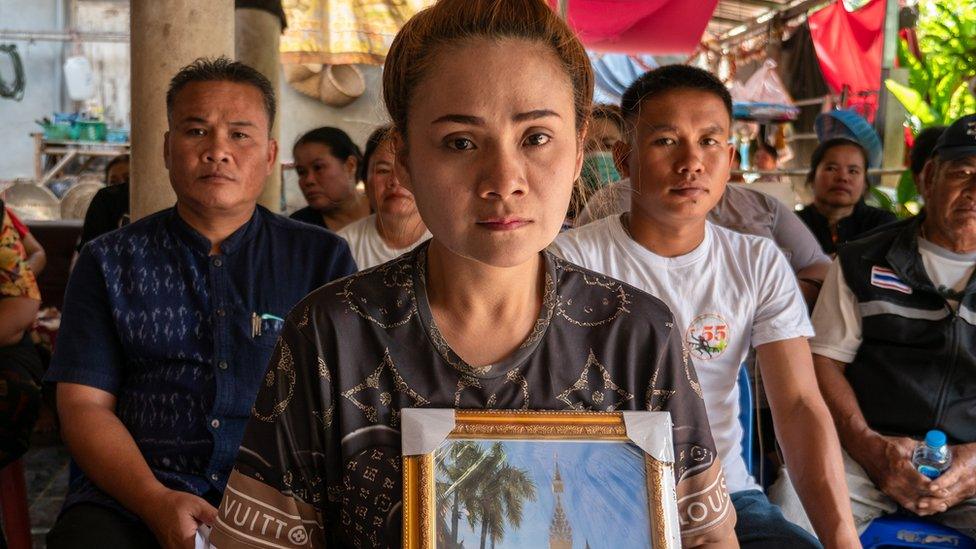
Narissara is praying for her husband's safe return
He left her and his six-year-old son in June last year to work on an avocado and pomegranate farm in the Nir Oz kibbutz, not far from where Golf was working.
Nir Oz was one of the communities worst affected by the attack. One in four of those who lived there are believed to have been killed or kidnapped by the militants, including many children.
Narissara's only hope is that Nattapong may have been abducted, although he is not on the government's list of Thai hostages.
People have always moved away from north-eastern Thailand in search of work.
The mainly rural region is one of the poorest in the country, where rice farming provides only a bare subsistence living and well-paid jobs are scarce. More than 80% of Thai workers in Israel are from the north-east. They started going to Israel in the 1980s and the arrangement was formalised in an agreement between the two governments in 2011.
It has not been without controversy. Human rights and labour groups have in the past complained about the Thais being overworked in unsafe conditions.
People told the BBC they have to pay significantly more than the official fees of around 70,000 baht ($2,100) to get to Israel - often up to 120,000 baht including extra costs and unofficial payments. But they also say they can earn seven to eight times more than in Thailand. Some praised their Israeli employers for looking after them and paying them on time.
"Partly it's about improving their social status," says Poonnatree Jiaviriyaboonya, an anthropologist at Nakhon Phanom University. "Those who came back from working overseas get more respect. They seem more cosmopolitan, more educated. But in reality, [they] are still poor migrant workers, poor rice farmers who have been neglected by the government. We need to shake up our policies for developing this region so people do not have to leave their families and go overseas."
The debts they have incurred are a worry for those who have come back early. They borrow money against their land or their house - and they normally work in Israel for at least five years, so they can pay off what they owe.
Golf's younger sister took out a loan for him to go last year. Narissara's mother mortgaged her rice-fields to raise the 200,000 baht they needed to send Nattapong to Israel.
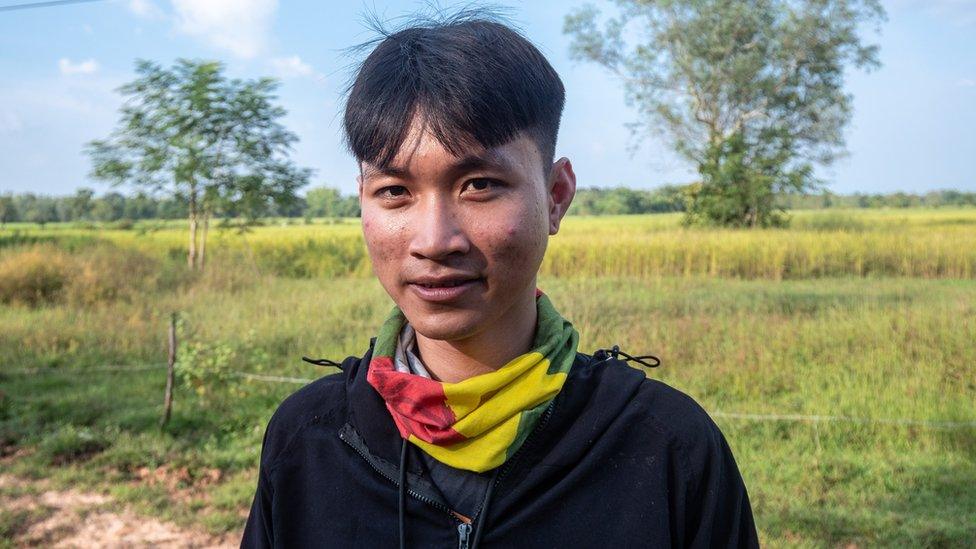
Anusorn Kamang, 25, says he is thinking of returning to Israel
This is weighing on the mind of Anusorn Kamang, a 25-year-old whose mother also mortgaged her land for him to go to Israel.
He spent a harrowing few days under constant rocket attack at the organic vegetable farm where he was working, before borrowing more money for his flight home.
The Thai government has promised to reimburse that cost, but his mother's debt is still there, and he is thinking about going back, once the fighting stops.
"I earned a lot in Israel, and my employer was good to me. Working here won't get me anywhere. It's enough for food, but that's all. I want a house and a car. I have none of that yet."

More on Israel-Gaza war
Follow live: Latest updates
Explained: What is happening in Israel and Gaza, and why now?
History behind the story: The Israel-Palestinian conflict
Gaza: Dead and wounded strain Gaza hospitals as air strikes intensify

Related topics
- Published23 November 2018
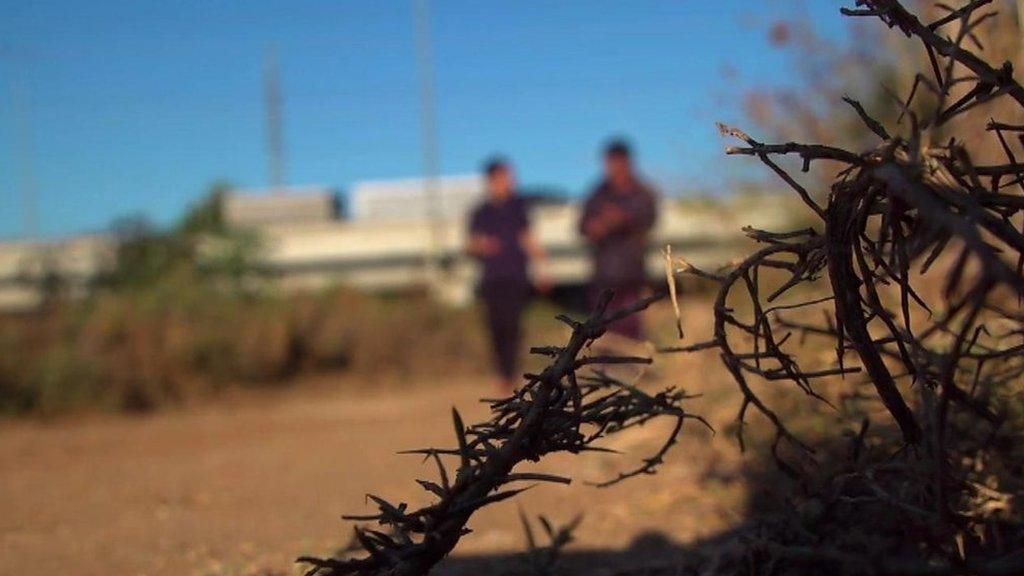
- Published9 October 2023
